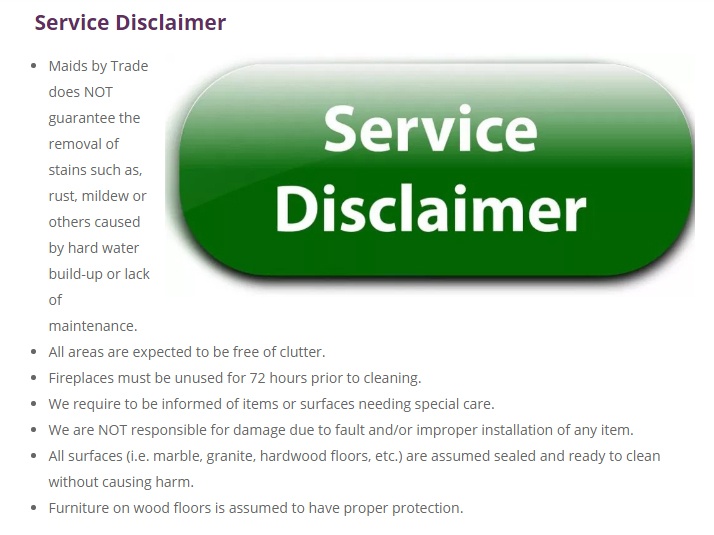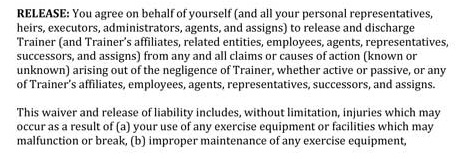Services Disclaimers
You see them everywhere, from the emails you receive and the websites you visit to the contracts you sign. Disclaimers are an important part of virtually every business, and even if you're simply offering some fun advice on your personal blog, you need one.
How do Disclaimers work?
They're designed to put your customers on notice. Assuming you've created a proper disclaimer, it will be conspicuously displayed on your website, on your emails, on your blog posts, and in your contracts. That way, people know exactly what they're getting into before they do business with you or take any advice you may be offering.
When you're providing a service instead of a physical product, you need to word your disclaimer a little bit differently. However, a disclaimer for services has the same goal as any other disclaimer -- to protect you from legal liability.
Just like other disclaimers, a service disclaimer is a written statement that clearly explains what you aren't taking responsibility for and lists any other customer rights that you've decided to limit.
For example, Maids by Trade has a very specific service disclaimer that tells customers exactly what work they do and don't do:

This may look like a long list, but it ensures that Maids by Trade and all of its customers know exactly what kind of service is going to be performed. For example, if your shower is full of mildew stains, there's no guarantee that Maids by Trade is going to be able to get rid of them. Or, if your kids leave toys all over the floor in their rooms, Maids by Trade won't move the clutter out of the way so that the rooms can be cleaned.
By having a specific disclaimer for its services, Maids by Trade can avoid problems that may have popped up because customers didn't know what would and wouldn't be cleaned.
Now let's say you're a personal trainer who works one-on-one with clients. Your disclaimer for services should include something like this from Total Coaching:

The service you're providing is a personalized, one-on-one gym session, and this disclaimer makes it clear that your client is doing your exercises and using your fitness equipment at his own risk. This service disclaimer goes into a bit more detail by saying that your client assumes "the risk of any and all injury and/or damage you may suffer."
As a result, your client doesn't have any right to take legal action against you if he injures his ankle, pulls a muscle, or breaks his fancy watch during your training session.
Just remember that even the best service disclaimer in the world won't necessarily protect you from negligence. If someone says you acted negligently and wound up injuring or causing him damages as a result, a court may find you legally liable.
For example, if you provide personal training services, your disclaimer likely won't help if you haven't been properly maintaining your exercise equipment, even if you have people sign a release like this:

While this release does say that the exercise equipment or facilities "may malfunction or break," a court would likely only side with you if something malfunctioned or broke because of normal wear and tear. However, for example, if you never got around to tightening the bolts on the pedals of your stationary bike and one flew off and injured your client, that's not normal wear and tear. A court would likely say that you were negligent and this release would be null and void.
Which businesses need to create a Disclaimer for Services?
All of them!
If you provide any kind of service to other people, it's a good idea to have a service disclaimer. Some common examples are:
- Web hosting companies
- Cloud services
- SaaS apps
- Cleaning companies
- Copywriting firms
- Couriers
- Fitness professionals
- Banks
- Investment firms
- Hotels
Even if you're offering a free service, a disclaimer can still come in handy.
Different types of Disclaimers for Services
Disclaimers for services can be a little tricky because there are so many different types of them.
The exact disclaimer you use depends on the specific service you offer. For example, a courier is going to have very different liability issues than an investment firm does.
Here are some of the most common service disclaimers:
1. Not responsible for errors or omissions
When the service you're offering is expert information and/or advice, this is an important disclaimer to include. After all, mistakes can happen, and you don't want your clients to make a major decision based on a typo!
If you're one of Goldman Sachs' clients and you decide to receive information from them in emails, you're going to be presented with this service disclaimer:

Goldman Sachs does not guarantee that the information they send to you will be "accurate or complete." They believe it will be, and they're going to do everything they can to make sure it is, but they don't guarantee perfection. As a result, they are "not responsible for errors or omissions that may occur."
2. Warranty
You've probably seen warranties for physical products, like refrigerators, cars, and computers. In a service disclaimer, the warranty works a little bit differently. Here's how things get different:

Among other things, Synopsys offers software to power things like smartphones and smart medical devices. If, within the first 90 days you notify them that their service isn't "consistent with applicable industry standards," Synopsis will either re-perform the service or refund the money you paid for it.
3. Refunds
Some service disclaimers will allow customers a chance to receive a refund. Typically, though, there's a limited time window for these refunds to be granted.
Here's an example of this kind of disclaimer from RAGE Software:

As long as it has been less than 30 days since you started using web hosting, you can ask for your money back. There are some stipulations, though. For example, if you've already got a dedicated domain, SSL, or IP, you don't qualify for a refund because those things cannot be transferred to anyone else.
4. Third party disclaimers
If you provide a service that relies even a little bit on third party contractors, you need to address them in your service disclaimer.
Let's say you're an event planner who coordinates things like weddings and professional conferences. Since you're not the one who cooks the food, supplies the flowers or plays the music, you don't want to be held liable if those people don't hold up their end of the bargain. By mentioning third parties in your disclaimer, you can limit your legal responsibility if the band just doesn't show up one night.
Oftentimes you'll hear these disclaimers referred to as "Indemnification Clauses" or "Indemnification Agreements." Simply put, this is a portion of your contract that says your client can't turn around and sue you if the band doesn't show up.
Take a look at the service disclaimer that First Service Credit Union has:

FSCU makes it clear that it's not taking any responsibility for links on its website that don't belong to FSCU. If you click on one of these third-party links, make a purchase, and wind up being dissatisfied, you can't blame FSCU for it. Or, if you click on a third-party link and wind up getting a computer virus, you can't take legal action against FSCU.
5. Unforeseen circumstances
Sometimes, no matter how hard you try to make everything perfect, things can go wrong and negatively impact your service.
For example, The Signature Travel Network is a travel consulting company, and one of the services they offer is a Private Car and Guide tour. During this tour, you're chauffeured around town while the guide points out all of the cool stuff that you need to get out and see. However, there are several things that can make it impossible for them to do their job. That's why they have this disclaimer:

This service disclaimer is very basic. If there's some kind of natural disaster or rioting in the streets, it's not safe to be out and about doing a driving tour. While this may seem like common sense that doesn't even need to be said, it's better to be safe than sorry. By including it right at the top of their FAQ page, customers are going to see it -- and they're going to know that they can't take action against The Signature Travel Network if their tour gets postponed or cancelled.
6. Download disclaimers
If part of your service involves customers logging onto your website and downloading anything, this is a good addition to your service disclaimer.
Look at how the health insurance company Cigna includes this in its disclaimer:

Simply put, Cigna can't guarantee that the files you're downloading haven't been corrupted in some way. As a result, if you end up with a virus, a worm, a Trojan horse, or some other computer-related disaster, they're not on the hook for it. After all, you saw the disclaimer, so you knew there was no 100% guarantee.
Experts say that ANY disclaimer needs to be placed in a conspicuous spot so that other people can't help but see it. This is important for disclaimers for services, too, but you can give yourself even more protection by requiring a signature in your service contract.
If you're already printing up contracts for your clients to sign, make them sign or initial near your service disclaimer. Or, if you're doing everything online, get a digital signature or have your clients click a checkbox that says "I accept" for your Terms, including your disclaimer.
Either way, you'll then be able to prove the client read your disclaimer AND agreed to it.